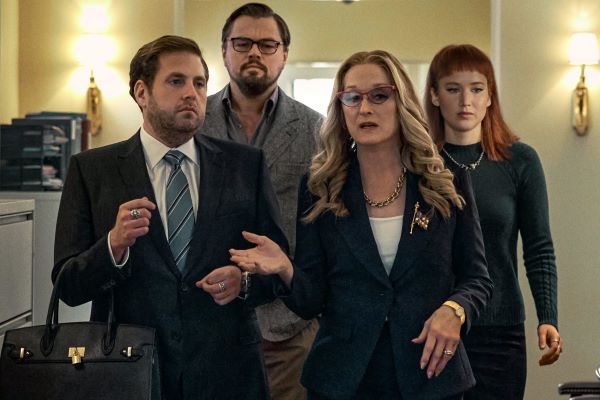When Michigan State University astronomy student Kate Dibiasky (Jennifer Lawrence) and her professor Dr Randall Mindy (Leonardo DiCaprio) discover that a comet is about to collide with Earth in six months time, they attempt to warn the President, Janie Orlean (Meryl Streep) and her son, Chief of Staff Jason (Jonah Hill). However, Kate and Randall’s information ends up being at first denied, then manipulated by the Orlean administration in order to divert attention away from a presidential sex scandal. As the comet nears the Earth, can Kate and Randall convince the world to pay attention to the impending threat?
McKay continues in the tradition of his previous political hits The Big Short and the Oscar-nominated Vice as he takes aim at climate change deniers, with no demographic spared. However, the subject matter can also apply to the current coronavirus pandemic and the resulting hysteria that has ensued. The reactions of the media, in particular their skewed priorities, are skewered with devastating accuracy, with Kate and Randall’s early encounters with television and the press showing how their warnings are both ignored and manipulated to assign statuses to them respectively.
The cult of celebrity is also lampooned with the character of the pop star Riley Bina (Ariana Grande), whose breakup with fellow collaborator DJ Chello (Kid Cudi) attracts more attention than the impending threat of the comet. However, Randall and Kate are also not immune to the price of fame, with the former’s affair with talk show host Brie Evantee (Cate Blanchett) jeopardising his relationship with his family and Kate being ostracised from the government’s plans due to her failure to play along with their delusions.
McKay also targets the super-rich in the form of Mark Rylance‘s billionaire tech CEO Peter Isherwell, whose plan to mine the comet for its lucrative rare-earth elements is adopted by the government in an excoriating takedown of the collusion between politics and big business that has been present in all aspects of contemporary society. Rylance provides Isherwell with a slimy, yet mousy speaking voice that manages to encapsulate the character’s nature in a concise manner.
For a film with such thematic density, it is impressive that McKay hasn’t lost his stylistic abilities, with the shots of the comet hurtling towards Earth as well as the attempts to neutralise it conveyed with impressively-rendered CG effects that lend a suitably apocalyptic finesse to proceedings. He also manages to avoid overusing the freeze-frame-with-accompanying-captions approach to exposition that hampered parts of The Big Short and Vice.
The high standard of directing is matched by the quality of performances, with the all-star ensemble cast giving it their all in their respective roles. Lawrence gets a chance to showcase her comedic talent in her portrayal of Kate’s frustration at everybody that doesn’t believe her, most notably in a running gag concerning her anger at having to pay for snacks at the White House. DiCaprio also impresses as Randall, expertly conveying the character’s neurotic energy without ever coming across as grating. However it is Streep and Hill who impress the most as the Orleans, with Streep providing an energetic performance as the self-centred President and Hill serving as effective comic relief during the Oval Office and NASA scenes.
Don’t Look Up sees McKay effectively combining the overtly-comedic approach of his earlier films with his later ‘docudrama’ style to convey the importance of just listening to the experts. This, more than the star-studded cast, is the reason why it is a must-see film.
Available now on Netflix
